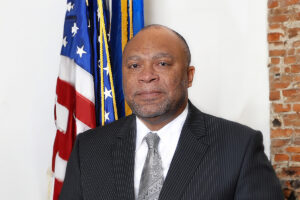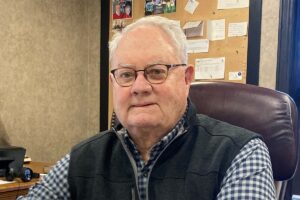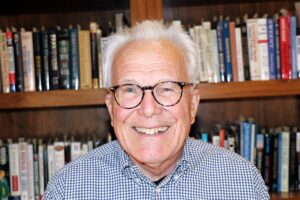Energy & Environment
Energy & Environment
About this Collection
Energy & Environment contains the interviews of individuals who were involved with development and implementation of state energy and environmental policy from the 1970s through the early decades of the 2000s. The interviews elicit insights about the policy making process, the assignment of priorities, and the give-and-take involved in reaching final policy decisions. Of special interest are instances in which Kansas developed singular solutions and means for implementing them.

Interview of Rod Bremby, December 22, 2023
Interviewed by Rex Buchanan
As Secretary of Health and Environment for Kansas, Rod Bremby became the first U.S. public official to deny a coal-fired power plant operating permit due to climate change. In this interview he reflects on that decision made while navigating uncharted policy terrain and on lessons learned during his 30-year career in public service at the local and state levels. Bremby describes missed opportunities in considering the power plant operating permit application while saying clearly that, even in retrospect, it was the right decision. Bremby also explains how integration of health and environmental policy makes sense at the Show Morestate level. Notably, Bremby paints a picture of leadership that recognizes and relies upon the expertise and experience of public servants who serve under appointed officials. Show Less

Interview of Sam Brownback, December 2, 2024
Interviewed by Rex Buchanan
Sam Brownback reviews his service to Kansas beginning with his time as Kansas Secretary of Agriculture and extending through his terms as Governor. Brownback credits his upbringing on a farm in Linn County for development of his views on conservation and resource management. He recalled dealing with the farm crisis and water issues, particularly those involving the Ogallala Aquifer, during his tenure as Secretary of Agriculture. He described carrying his concern for water into his terms as Governor as a vision focused on long-term sustainability for the Ogallala. He also recalled using extensive public consultations to further policy Show Morechanges such as helping to eliminate the "use it or lose it" mentality in the approach to groundwater usage. Brownback described himself as a strong advocate for wind power, supporting development of wind farms, particularly in the central and western regions of the state. He also described extending the protection of the Flint Hills from wind farm development. In the interview, Brownback highlighted his pragmatic approach to policymaking and relationships developed during his public service career.
Highlights -- short excerpts from the interview

Interview of John O. Farmer III, December 28, 2023
Interviewed by Rex Buchanan
In this late 2023 interview, John O. Farmer III recalled his long career in the oil business with his family-owned company in Russell, Kansas. Farmer described the evolution of the oil business over decades as technology changed and improved the possibilities for small- to medium-sized companies in the oil industry. He observed that federal policies and market price fluctuations have more to do with the success or failure of the business than state policies. However, he noted, the interplay of state tax policies can make or break companies that depend on low-production oil wells.

Interview of Jim Haines, November 2, 2023
Interviewed by Rex Buchanan and Mike Lennen
In this interview, Jim Haines describes his long career in the electric utility industry in Kansas during a tumultuous time. He talks about changes in the energy marketplace and in regulations regarding fuel types, safety, and the environment. He also identifies changes that enabled utilities to achieve economies of scale through mergers and acquisitions. Haines talks about the difficult years during which Wolf Creek, Kansas' only nuclear power plant, was under construction, including the public resistance to the plant and the push-back at many levels as construction costs escalated. In this discussion, Haines places the construction Show Moreand initial operation of Wolf Creek in the specific context of Kansas as well as the general context of the U.S. nuclear power industry of the 1980s. Show Less

Interview of Kelly Harrison, September 17, 2024
Interviewed by Mike Lennen
This interview of Kelly Harrison, retired vice-president for transmission at Westar Energy, covers Harrison’s 37-year career in an evolving electric utility industry from the early 1980s through late twenty-teens and his contributions to transmission development in Kansas and the surrounding region. Harrison recalls his start in the industry working for Kansas Gas and Electric, headquartered in Wichita, KS, after his graduation from Wichita State University. He was involved in many changes in the transmission portion of the industry as federal regulations opened electricity markets to more participants and as regionalization of transmission placed states and individual utility companies in Show Morenew relationships with one another. Harrison saw his involvement with transmission expansion, regulatory affairs, and environmental issues as a way to use his education and his skills to help people. Harrison’s interview provides valuable insights into the development of the electric utility industry, the challenges of transmission expansion, incorporation of renewable energy sources, and the regulatory landscape. His experiences highlight the importance of collaboration, innovation, and strategic planning in ensuring a reliable and sustainable energy future.
Highlights -- short excerpts from the interview
















